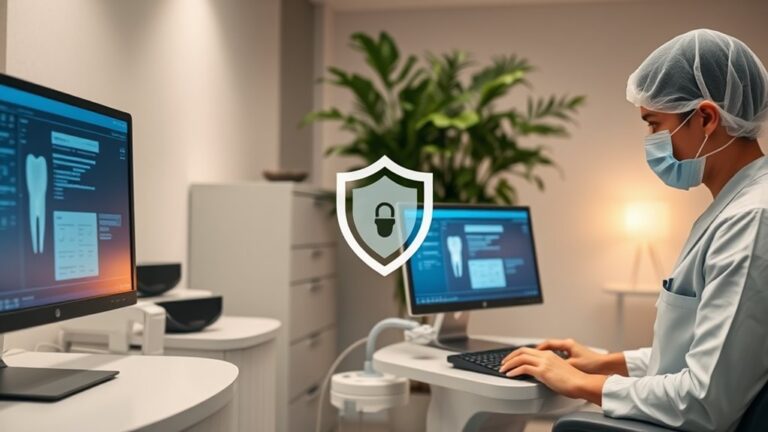Secure Your Dental Practice’s Digital Patient Records Now
You can't afford to overlook the security of your dental practice's digital patient records. With sensitive information at stake, implementing effective cybersecurity measures isn't just advisable—it's crucial. From understanding HIPAA compliance to training your staff, each step you take builds a foundation of trust and safety for your patients. However, the landscape of cybersecurity is constantly evolving, presenting challenges you might not have considered yet. What are the key strategies you should be focusing on to guarantee your practice stays ahead? If you need assistance, feel free to contact us. We can connect you with experts who can provide tailored solutions for your cybersecurity needs.
Importance of Digital Records
In today's fast-paced dental environment, having access to digital records can greatly enhance both practice efficiency and patient care. By utilizing digital records, you streamline the retrieval, updating, and organization of patient information, greatly reducing administrative burdens. Digital X-rays reduce radiation exposure significantly, further supporting the importance of modern diagnostic tools in your practice.
Automated reminders and seamless integration with practice management software allow your front desk staff to focus more on patient engagement, ensuring a welcoming experience for every client. Moreover, digital records provide an extensive overview of each patient's dental history. This enables you to make more informed treatment decisions and track changes over time, ultimately improving patient care. You can also utilize data analytics to identify trends and refine treatment protocols, tailoring approaches to meet individual patient needs.
With secure online access, multiple practitioners can coordinate care efficiently, enhancing communication and ensuring that everyone involved is on the same page. Patients can fill out digital forms before their visit, reducing waiting times and improving their overall experience. Shifting to digital records not only safeguards patient information but also elevates the quality of care you provide, fostering trust and long-term relationships with your patients.
Understanding HIPAA Compliance
Steering through the complexities of HIPAA compliance is fundamental for dental practices that handle sensitive patient information. As a covered entity, your practice must adhere to the Privacy Rule, which governs the use and disclosure of protected health information (PHI).
You'll also need to implement the Security Rule, which focuses on safeguarding electronic PHI (ePHI) through administrative, physical, and technical safeguards. It's essential to understand that HIPAA establishes standards for protecting sensitive patient data in healthcare.
Designating a Compliance Officer is essential, as they'll oversee the implementation of these regulations. Remember, all staff members must be trained annually on HIPAA policies to maintain accountability.
Be aware of HIPAA exemptions, as some minor entities may have different requirements, but most dental practices fall under strict compliance timelines. Regular audits and risk assessments are critical to guarantee your policies are effective. You're directly responsible for not just your compliance but also that of your business associates, who must follow similar protocols.
Essential Security Measures
To protect sensitive patient information effectively, dental practices must implement essential security measures that address both current and emerging threats.
Start by prioritizing data encryption, ensuring that all patient data is encrypted both in transit and at rest. Utilize advanced encryption standards (AES) for top-tier security and consider full-disk encryption software for sensitive information. Don't forget password protection for files and databases containing protected health information (PHI), as well as encrypting data on mobile devices.
Next, focus on network security. Implement robust firewalls and intrusion detection systems to safeguard your network. Regular security audits will help identify vulnerabilities, while organized computer systems can prevent the spread of issues in case of a breach. Notably, data breaches in dental practices rose by 45% over the last two years, emphasizing the urgent need for enhanced security measures.
Be cautious with wireless access points, ensuring they're appropriately secured.
Lastly, invest in ongoing employee training. Regularly educate your team on the latest cybersecurity threats, social engineering tactics, and best practices for creating strong passwords.
A proactive defense is built on awareness and adherence to security protocols. By taking these essential steps, you'll enhance the security of your digital patient records and better protect the integrity of your practice.
Cybersecurity Challenges in Dentistry
Cybersecurity challenges in dentistry are growing, with phishing attacks and ransomware incidents on the rise. Your dental practice is a prime target due to the sensitive patient data you manage.
Phishing attacks, the leading cause of data breaches, can result in unauthorized access to confidential information if employees fail to recognize suspicious emails. Consequently, investing in phishing prevention measures and regular training is vital for your staff to identify and respond to these threats effectively. Furthermore, the average data breach cost reached $4.35 million in 2022, underscoring the financial implications of inadequate cybersecurity.
Ransomware awareness is also imperative. Attacks by groups like the BlackCat gang can encrypt your data, demanding a ransom that disrupts operations and compromises patient confidentiality.
Reports from organizations, including the American Dental Association, highlight the prevalence of such attacks within the dental sector.
To safeguard your practice, verify that all employees are knowledgeable about HIPAA regulations and cybersecurity best practices. Implementing advanced antivirus and antimalware tools can further mitigate risks.
Enhancing Administrative Efficiency
In today's fast-paced dental environment, enhancing administrative efficiency has become crucial for practices aiming to provide high-quality care while minimizing operational costs. By implementing digital document management systems, you can achieve significant workflow optimization. Quick retrieval of patient records through keyword searches eliminates the lengthy manual paper-based processes.
Routine tasks like appointment scheduling and billing become seamless, allowing your team to focus on patient care rather than paperwork. Improved document accessibility means you and your team can access digital records instantly from any location, which is invaluable during emergencies or when coordinating care with other providers. Additionally, the integration of business technologies enhances overall efficiency in the dental office, further streamlining operations.
Multiple team members can view patient files simultaneously, promoting enhanced collaboration and reducing the risk of errors. Digital records also provide a thorough overview of a patient's dental history, empowering you to make informed treatment decisions.
Furthermore, automating administrative tasks helps cut costs associated with physical storage and printed materials. Secure online access not only guarantees compliance with health information privacy regulations but also ensures that records are available when needed.
Staff Training and Preparedness
Ensuring staff training and preparedness is essential for maintaining compliance with HIPAA regulations in a dental practice. Regular training on HIPAA's Privacy Rule, Security Rule, and Breach Notification Rule helps prevent violations and protects patient information.
By engaging your staff in meaningful training programs, you enhance their understanding of compliance requirements and their crucial role in safeguarding protected health information (PHI).
To achieve training effectiveness, conduct annual updates to keep your team informed about the latest HIPAA regulations and best practices. Utilize available resources, such as the extensive HIPAA library, to support your training initiatives.
Emphasizing the importance of confidentiality and proper use of technology systems will prepare your staff to handle sensitive information responsibly. Secure handling of records is a critical aspect that should be highlighted during your training sessions.
Appointing a HIPAA Compliance Officer can further strengthen your efforts by ensuring adherence to all regulations. Regularly review and update your training programs, identifying gaps and areas for improvement.
Engaging your staff in ongoing discussions about data security best practices fosters a culture of compliance, making it clear that everyone plays a crucial role in protecting patient data.
With a well-trained team, your dental practice can thrive while maintaining the highest standards of patient privacy and security.
Developing an Incident Response Plan
A well-crafted incident response plan is vital for any dental practice aiming to protect its digital records and patient information. Start by implementing robust systems for incident detection, such as virus and intrusion detection software, firewalls, and email protection systems.
Establish clear protocols for reporting cybersecurity issues and environmental hazards, guaranteeing your team can quickly identify potential threats. This early detection is crucial in mitigating risks before they escalate into more significant problems.
Next, outline procedures for incident containment and mitigation. Assign responsibilities for evaluating incidents and create a plan for isolating affected systems while preserving evidence. Effective communication with stakeholders is essential during this phase.
For incident recovery, develop a thorough data backup and disaster recovery plan to restore systems and data swiftly. Outline emergency operations to maintain continuity during incidents.
Regularly test and update these contingency plans to confirm they remain effective.
Finally, conduct post-incident activities to evaluate your response. Document each incident, review the effectiveness of your plan, and identify areas for improvement. Regular audits will help you adapt your incident response plan, enhancing your practice's resilience against future threats and safeguarding the safety of your patients' information.
Frequently Asked Questions
What Are the Costs Associated With Digitizing Dental Records?
Digitizing dental records involves costs for software, hardware, and training, alongside ongoing expenses for data security and compliance. Implementation challenges may arise, but the long-term benefits in efficiency and patient satisfaction often outweigh these investments.
How Long Does It Take to Implement Digital Record Systems?
Implementing digital record systems can feel like launching a rocket, but typically, the timeline spans several weeks to months. Prioritize thorough training and robust record security to guarantee a successful shift for your practice.
Can Patients Access Their Digital Records Directly?
Yes, you can access your digital records directly through secure online systems. This guarantees patient privacy while maintaining data security, allowing you to view your treatment plans and thorough dental history anytime, from any device.
What Software Options Are Best for Dental Practices?
For dental practices, consider cloud solutions that enhance patient management. Look for software offering scheduling, billing, and electronic signatures, alongside robust HIPAA compliance features. This combination guarantees efficient workflows and improved patient engagement, ultimately benefiting your practice.
How Do I Choose a Reliable IT Provider for My Practice?
When you're selecting a dependable IT provider, focus on thorough evaluation criteria. Prioritize cybersecurity considerations, ensuring they have robust measures in place. Look for expertise in dental-specific needs to enhance your practice's overall efficiency.
Conclusion
In today's digital age, securing your dental practice's patient records isn't just a necessity—it's a responsibility. As you reflect on the measures you've implemented, consider: what if a breach occurs tomorrow? By prioritizing cybersecurity and training your staff, you not only protect sensitive information but also fortify the trust your patients place in you.
Don't wait for a crisis to strike; take action now to guarantee your practice remains a safe haven for patient data in an unpredictable world. If you're feeling overwhelmed by the complexities of cybersecurity or unsure where to start, remember that you don't have to navigate this alone. Reach out to us for expert assistance.
Our team can help you save time, reduce stress, and enhance the security of your dental practice. With our guidance, you can focus on providing exceptional care to your patients while we ensure your practice is fortified against potential threats. Don't hesitate—contact us today to secure your practice's future!





